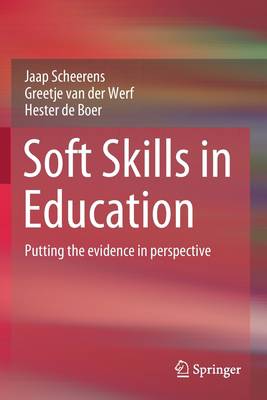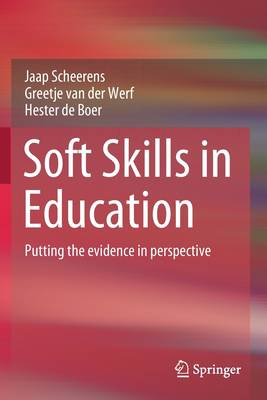
- Retrait gratuit dans votre magasin Club
- 7.000.000 titres dans notre catalogue
- Payer en toute sécurité
- Toujours un magasin près de chez vous
- Retrait gratuit dans votre magasin Club
- 7.000.0000 titres dans notre catalogue
- Payer en toute sécurité
- Toujours un magasin près de chez vous
Soft Skills in Education
Putting the Evidence in Perspective
Jaap Scheerens, Greetje Van Der Werf, Hester de BoerDescription
This book examines the global movement of putting more emphasis on students' social and emotional development in education. It provides some order in the unstructured multitude of desirable socio-emotional educational objectives and ambitions that have resulted from this movement and builds on a careful conceptual analysis. It starts out by examining the roots of the movement and discusses different emphases. Next it makes use of instructional and psychological constructs and theories to arrive at meaningful categorizations of major domains and types of social-emotional "skills". One of the key assumptions is that social and emotional attributes are malleable by means of educational interventions. The book reviews available research evidence for this assumption, taking into account psychological studies and meta-analyses. It then creates new evidence based on a new meta-analysis, which concentrated on the effects of educational interventions on skills associated with the conscientiousness factor of the Big5 taxonomy. In the final chapter, the book discusses the implications for educational policy and practice; a discussion in which attention is given to political and ethical questions about the desirability of treating social and emotional attributes as educational goals.
Spécifications
Parties prenantes
- Auteur(s) :
- Editeur:
Contenu
- Nombre de pages :
- 239
- Langue:
- Anglais
Caractéristiques
- EAN:
- 9783030547899
- Date de parution :
- 26-08-21
- Format:
- Livre broché
- Format numérique:
- Trade paperback (VS)
- Dimensions :
- 156 mm x 234 mm
- Poids :
- 362 g

Les avis
Nous publions uniquement les avis qui respectent les conditions requises. Consultez nos conditions pour les avis.






